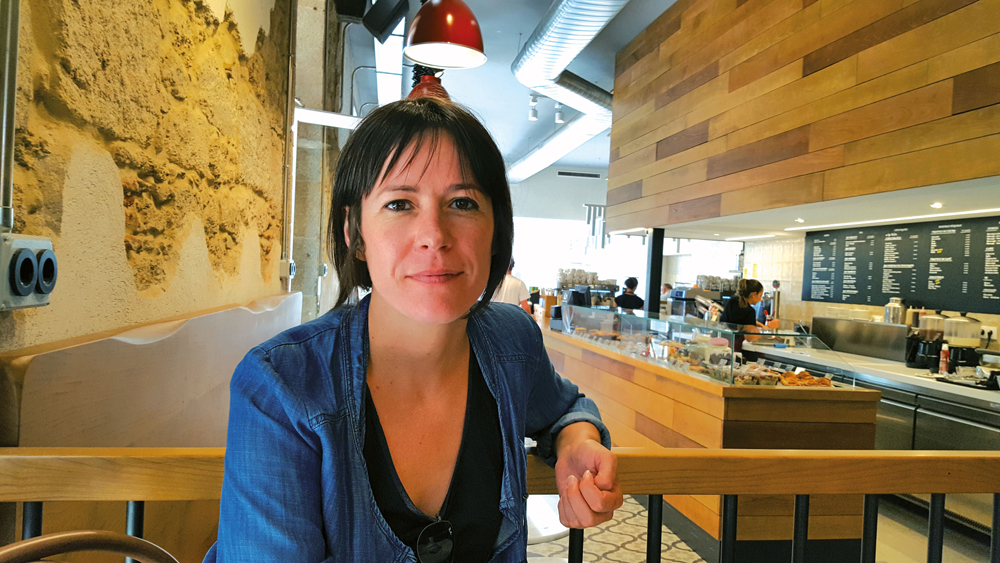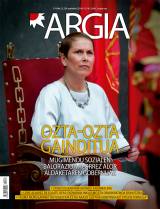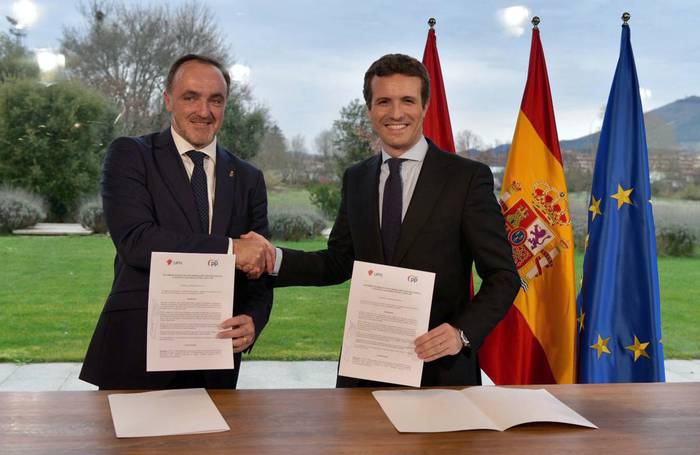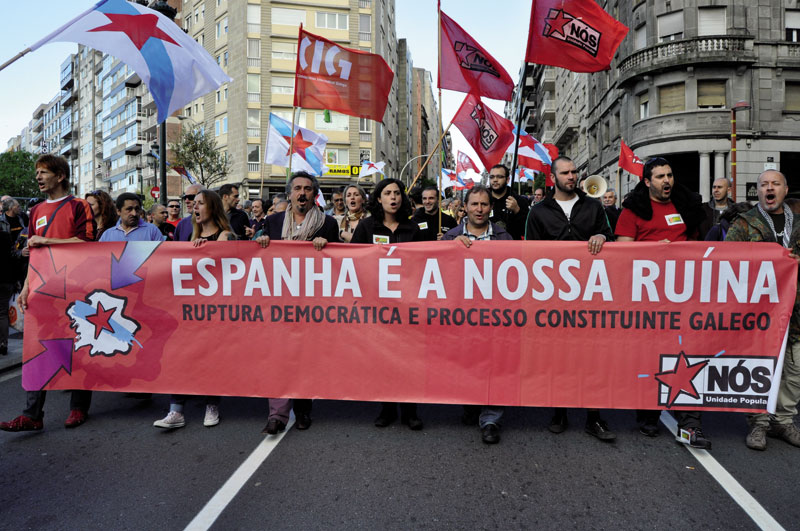"In Galicia nationalism is bigger than what the elections say"
- Sarria (Lugo), 1977 At 18, he went to Santiago de Compostela to study political science and did not return to the village. He started a very young military man at the BNG, and he was also very young when he assumed responsibility positions in the organization. He has been a member of the Galician Parliament since the age of 26 and was elected national spokesman for the BNG in February. After avoiding the disaster that the polls predicted in the September elections, Galicia is already talking about the “Pontón effect”.

In February, you were elected to the head of the BNG, at the same congress in which the Addiante Process (Aurrera) was approved, which aims to re-establish the entity.
The BNG has lost support for a decade, both in terms of election results and in terms of social outcomes, which has generated a profound debate. The PSOE-BNG ended with a mixed government and the PP regained the absolute majority, which provoked an intense debate on the role of Galician nationalism. Finally, that debate divided the BNG, and a sector, more significant by the importance of some, such as Xosé Manuel Beiras, chose the path that has ended within En Marea. This path moves away from the traditional practice of Galician nationalism, participating in a movement across the state rather than betting on the political forces themselves.
Is the additive process, then, the reaction of the BNG to this division?
We ourselves believe that there has been a change in society and that we are at a different political moment, both by what is happening in the state and by the influence of globalization on the construction of our identity. The dominant personality is violently blurred. At the last Assembly we stood still and assumed that some things have not been done well. We have to change part of our vision and our discourse. I believe that the changes we have begun to make this year have borne fruit, the last election campaign has served us to reconnect with the people.

Since 2001 the BNG has achieved worse results in each election than in the previous one, and they came with very poor anticipation to the last elections to the Parliament of Galicia. In the end, you lost a parliamentarian and you went down from seven to six. Is this a result that can be considered a success?
We have to bear in mind that our starting point was not seven. Extrapolated from the results of the Spanish elections in June, we were outside the Parliament of Galicia. One of the hardest controversies of the last national assembly was that relating to participation in the space En Marea.
They decided no.
And I think we're right, because I don't regard En Marea as a force in the realm of Galician nationalism, even though some people who are there identify as such. Their references fall within the scope of Podemos and fall within the scope of the State. In some respects we can agree, but it is clear that we have different frameworks of reference. They refuse to put on the table the debate on the right of our people to decide. This starting point separates us.
It is often said that, historically, 25% of Galicians are considered nationalist, according to surveys. The BNG has only achieved that percentage of votes once in 1997.
I don't know how we can tell if these surveys are an accurate reflection of reality. But it is clear that in Galicia the feeling of patriotism is higher than the electoral results indicate, it is a historical constant. One of the keys, in my view, is that many of those who feel Basque do not join the political forces in this area and do not vote or give in to others. In any case, our objective is to exceed that 25% and that nationalism is once a majority.
“In Galicia the real left must necessarily be abertzale because in order to give it social freedom it must be possible to put an end to the colonial role of the state that we still have”
Seen from the outside, it seems almost impossible to get there. The PP gets the absolute majority almost all the elections…
Everyone must understand their reality. Here things do not just happen because we Galicians are conservative, that topic is used a lot and has nothing to do with the reality of this people. Galicia is one of the places with the most trade union fighting and social mobilizations in the Spanish State. Awareness and participation are high. But here are very different sociopolitical and demographic dynamics. If you look at the map, you realize that the PP is the owner of the counties where the aging and depopulation of the population are greatest. Pp has a very solid structure in Galicia, and is very majority. In many places, being on a municipal list of BNG can cost a lot: risk of job loss, threats... Here, some of the dynamics gathered from Franco are still alive and condition the political and social behavior of Galicia. In addition, our media map is completely right-wing.
The hegemony of pp, on the one hand, and the alleged lack of electoral expression of the social weight of nationalism, on the other hand, can be consequences of the absence of a right-wing formation in Galicia?
It's a classic question. Why is there no right-wing patriotism in Galicia? In part, because of the class structure and history of the country. There has never been a Galician bourgeoisie, which had been brought from the outside. At the time of feudalism, all local nobility was replaced by external nobles, the Galicians were deported or power was taken away, even from ecclesiastical authorities. The powerful were Castilian, not native. Then, when the industrial revolution occurred, much of Galicia was left out of this process, and the small industrialization came largely from the hands of external owned companies, was not linked to a Galician elite. Within the Spanish State, Galicia has always had an internal colonial function. In this situation, the true left necessarily has to be abertzale, because to give a social liberation, the end of this colonial role has to be achieved. In the state we have the lowest wages, the lowest pensions, the most marginal function in the economic structure...
One of the things that's being debated in the additive process is whether the BNG defines itself as a independentist? I've never done it to this day.
I don't think that's the problem. At the BNG we believe that a political force must adapt to the level of awareness of its people and see how to foster national sentiment. In this context, the important thing is to say that Galicia is a nation and has the right to exercise self-determination. Once the law has been recognised, we will discuss how to do it. We always have the example of Puerto Rico: independent, but only formally. And we are seeing that in the European Union many independent states have no sovereignty, that is Greece. It is clear that strategies cannot be the same everywhere. Basque nationalism does not act in the same way either in the CAV, in Navarre or in Iparralde.
Uztailaren 3an eta 4an, Bizitzeko Eskubidearen aldeko Nazioarteko Mintegian bildu dira hainbat parlamentari Madrilgo Diputatuen Kongresuan. Alboko aretotik, emakumeen elkarteek eta oposizioko alderdiek ezetz esan diete, ez dutela abortuaren lege erreforma onartuko.
Prestige petrolio-ontziko hondamendiaz 11 urte igaro direnean itxi da auzia, errudunak salbuetsita. Coruñako lurralde auzitegiak eman du azken ebazpena eta erantzukizunik gabe utzi ditu ingurumenaren aurkako delituagatik akusatutako hiruak eta Espainiako Gobernua bera,... [+]
PP, PSOE eta UPyD alderdiek ezezko borobila eman zioten Kongresuan herrien autodeterminazio eskubideari. Amaiur koalizioak, Kataluniako ERC-k eta Galiziako BNG-k eramandako erabakitzeko eskubidearekin lotutako legez besteko proposamena eztabaidagai izan zen atzo Madrilgo... [+]
Amaiur koalizioak, Kataluniako ERC-k eta Galiziako BNG-k autodeterminazio eskubidearen gaia eramango dute gaur Madrilgo Kongresura, legez besteko proposamen baten bidez. Erreferendumak antolatu ahal izatea bozkatuko dute diputatuek.
Espainiako Kongresuko 31 diputatuk eta Senatuko 13 kidek Parot doktrina izenez ezagunagoa den 197/2006 doktrinaren aurkako manifestua sinatu eta Giza Eskubideen aldeko Nazio Batuen goi-komisarioari bidali diote, doktrinak "legedia penalaren eta segurtasun juridikoaren... [+]
























